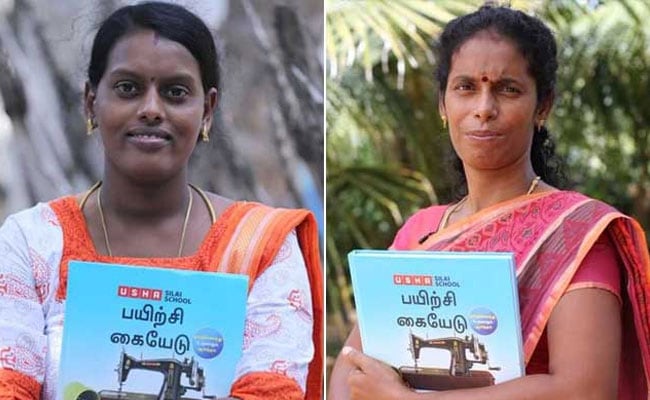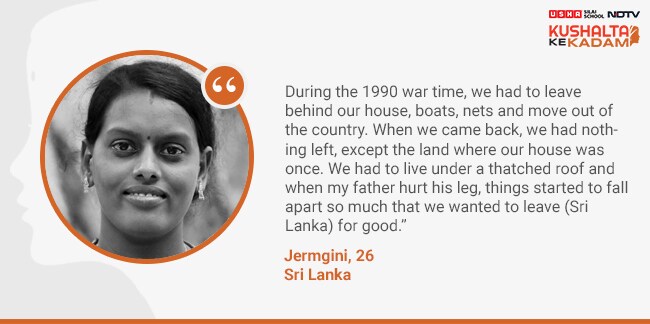- Home/
- Leaving Behind Civil War Memories, Sri Lankan Women Get Back On Their Feet
Leaving Behind Civil War Memories, Sri Lankan Women Get Back On Their Feet

Even though, today, the country shows robust economic recovery, the families residing in the countryside haven't fully recovered from the decades of violence to rebuild their lives. After the war ended, many of the displaced families made their way back to their country, from India where they had taken temporary shelter. However, due to a shortage of jobs and opportunities, especially for poor Tamil women, like Nagawani and Jermegini, life remained as hard as it had been. Says, Nagawani who returned to her home country from India after she was married,
Nagawani's husband is a house painter by profession and her parents are daily-wage laborers. Since, their combined income was never sufficient, Nagawani decided to contribute towards the household income by tailoring garments.In the 90s, Sri Lanka was in turmoil. We were three siblings and our parents had moved us to India to escape from the war. As I didn't do well academically, I dropped out of school. That's when I learned sewing and started tailoring.
"When they (Usha Silai School coordinators) came to talk to me about the school, they asked me about my work. Impressed, they asked me to join the training programme," she said.
Usha International has set up small training schools across India, Sri Lanka and Nepal teaching underprivileged women sewing and embroidery.
"The training was conducted in Thoranamalai, and I studied with 20 other women. They taught us how to take measurements, cut and stitch" she said. "Even though I have been stitching for a long time, their techniques were new and helpful" she said. Today, her business is continuing to grow and she is earning Rs 6000 per month, and even more during festivals.
Ask her the best thing that stitching has given her, and she talks about the gift she managed to buy from her savings for her new born daughter, a gold chain. Thanks to her own earnings from tailoring.
Like Nagawani, Jermegini, 26, living in the Pannankattikottu village in Mannar District had her own share of troubles. During the entire period of the civil war, Jermegini and her parents had often moved back and forth from Sri Lanka to India. When she finally returned to Sri Lanka in 2013, she had come home with Bachelor's degree in Business Management, hoping that her qualification would help her find a job. Unfortunately for her, things didn't turn out to be easy as finding a job was proving to be an uphill task.
The Organisation For Eelam Refugee Rehabilitation - Ceylon (OfERR) came into being in 1984 as a voice for the Sri Lankan Tamil refugees who moved to India for refuge during the period of the war. The organisation has since then helped millions of victims to regain the control of their life and receive their fundamental right to live peacefully with dignity in their own country. In Jermegini's village, the NGO introduced the Usha Silai School and helped many like her who had no sustainable source of income to earn their livelihood.When I got back, I didn't know what to do. I got to know about the Usha (Silai School) tailoring course from OfERR Ceylon NGO."
Like Nagawani, Jermgini has made sewing her main source of livelihood. "Initially, I thought I would only earn Rs 3,000 a month from stitching garments for women. But now that I have a formal training, more of my friends have started placing their orders with me."When my friends and I got to know about the training course, we were hesitant about it at first. Eventually, we were convinced and decided to go for their selection interview, she says. After going through the complete training, I learned to stitch various garments.
Jermgini has begun earning nearly Rs 25,000 to Rs 30,000 on an average per month.

Echoing Jermgini's thoughts Nagawani too, believes that "finding employment is a big problem for women in Sri Lanka" and "tailoring is a good skill to acquire." For both these women and many more who have gotten back on their feet in their own country after turmoil ended, Usha Silai School has played a major role in helping rebuilding lives.Now that I have completed the training course, I see more women considering me as their role model. They, too, want to learn sewing and pursue tailoring as a career.
Also Read: Gomi Devi: Lifting Up The Veil To Pick Up The Reins Of Her Life
Related Stories
More- Team NDTV | Monday February 16, 2026
Odisha's Suchismita Sahu, Rajasthan's Preeti Prajapat, Manipur's Akhirun—Usha Silai School's Kushalta Ke Kadam celebrates these awardees, from homemakers to master trainers earning accolades
- Team NDTV | Thursday February 12, 2026
From Ladakh peaks to Assam fringes, Usha Silai School trains tribal women in Turtuk, Kargil & Dakhinkuchi—crafting livelihoods with armed forces, NHPC & NGOs. Stitching national resilience
- Team NDTV | Thursday January 29, 2026
From West Bengal's transgender tailors to Telangana's tribal seamstresses and Meghalaya's embroidery revivalists, Usha Silai School's Kushalta Ke Kadam partners with NIRDPR and state governments
- Team NDTV | Tuesday February 03, 2026
In Odisha's mining heartlands, Mahanadi Coalfields Limited teams with Usha Silai School's Kushalta Ke Kadam and Gram Utthan, empowering tribal women turning them into entrepreneurs
Adopt a Silai School
About the Initiative

Kushalta Ke Kadam, an initiative by USHA Silai School and NDTV has entered its eighth season. The aim is to empower more women across rural India by teaching them sewing skills and helping them open new doors of opportunities for themselves. The initiative encourages rural women to become financially independent and entrepreneurs by taking up sewing and training others in their respective communities.
Since 2011, the USHA Silai School initiative has trained more than 12 lakh rural women through over 33,000 Silai schools, spanning over 20,751 villages across India.
The women earn Rs. 4,000 – 5,000 per month on an average, with the highest recorded monthly earning being Rs. 84,000 in a month. This earning works as a catalyst towards building their self-confidence, reducing gender inequities, and raising their stature within their families and in society at large.
In Pics

Rebari girls grow up learning traditional embroidery, which along with their new found sewing skills developed at Usha Silai Schools, is helping them earn a living.

Usha Silai School has empowered many rural women to support their family and send their children to school.

The Usha Silai School, established in a small nondescript village that goes by the name of Kottai, is helping empower people from varied communities.

The all-inclusive Usha Silai School Programme covers the entire nation from hamlets tucked between hills to villages cast by the sea.

Vegetables farmers from the Mizoram hills earn very little given the topography of the area. Usha Silai Schools have played an important part in this region by skilling women to financially contribute towards their households.

Usha Silai School learner Lucy has trained seven other women in her community, helping them to become financially independent.

Women like Kaviben from the nomadic Rebari community are finally laying down their roots as they begin to gain financial independence and thereby stability through Usha Silai School.

Usha Silai School, located in the Gujarat's Bhuj village, is enabling rural women to earn as much as Rs. 2,500-4,000 each month.

Usha Silai School, in association with a Gujarat based NGO called Kala Raksha, is trying to bring about a Silai revolution in Bhuj.

Besides training other women from their community, many Usha Silai School learners have become entrepreneurs in their own right.

With sewing becoming easily accessible and lucrative, the silai schools are also helping revive traditional motifs and designs.






